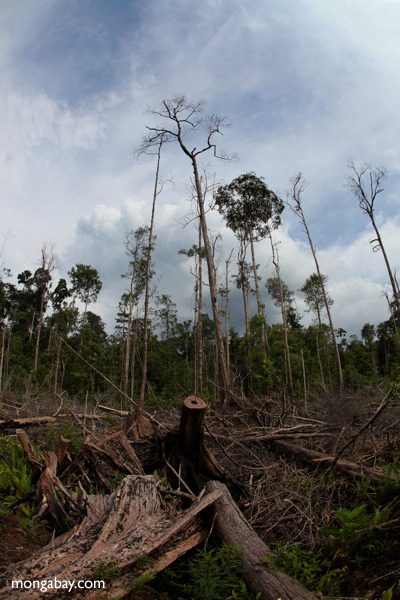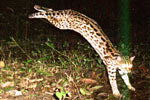Enormous wood fiber concession appears in West Kalimantan, threatening critical habitat. Environmental groups cry foul, claiming impact assessments were not properly done before plantation company set up shop.
A major wood fiber concession has moved ahead on developing a sizable chunk of forest in one of Indonesia’s most vulnerable provinces before a formal conservation assessment of the land could be completed, Greenomics Indonesia reports.
The organization recently published a report detailing pulpwood plantation concession company PT Mayawana Persada’s decision to build roads and a river port in areas of West Kalimantan that are known to contain high conservation value (HCV) forestland. This, before the High Conservation Value Resource Network (HCVRN) finished its peer review of an HCV report conducted by environmental consulting firm Hatfield Indonesia, according to the report.

Remaining West Kalimantan forests are home to many species, such as this Borneo gliding leopard tree frog (Rhacophorus pardalis). Photo by Rhett A. Butler.
The document also revealed 66,900 hectares of forest — nearly half of the 136,710-hectare concession — have high conservation value. Yet only 20,700 hectares of that were designated as protected at the time of the initial HCV report.
According to data issued by the International Union for the Conservation of Nature (IUCN), the remaining 46,200 hectares are critical Bornean orangutan habitat. Rampant deforestation on the island has caused the endangered species’ populations to decline significantly in recent years, with some estimates putting the number of wild Bornean orangutans left at just 45,000 individuals.
“The question that needs to be asked is what precisely motivated PT Mayawana Persada to adopt this course of action before the results of the peer review are published?” Greenomics Indonesia wrote. “The development of road infrastructure for land-clearing purposes is taking place in the remaining large forested blocks contained in the concession, which includes HCV areas.”
It’s a reasonable question, considering PT Mayawana Persada’s supposed sustainability credentials: one of its shareholders, PT SJM, is a Forest Stewardship Council (FSC) certificate holder and a member of the World Wildlife Fund’s (WWF) Global Forest and Trade Network (GFTN).

Rainforest understory in West Kalimantan. Photo by Rhett A. Butler.

Draining and burning of peatland forest in West Kalimantan to make the land suitable for human development, such as the establishment of tree plantations. Photo by Rhett A. Butler.
One possible explanation for the premature development came in the form of a rumored deal that the concession is set to supply Asia Pacific Resources International Ltd. (APRIL), Indonesia’s second-largest pulp and paper producer. APRIL announced in January that it would put a halt to its expansion activities by year’s end and stop deforesting entirely by 2019. But environmental activists have routinely accused the company’s sustainability claims of not being far-reaching enough as it continues to chop down forests.
“APRIL and its long term supply partners are in the process of completing the establishment of renewable plantation forest and will have completed plantation establishment by the end of 2014,” a source within the company told mongabay.com. “The remaining plantation areas are being established in areas that have been HCV assessed.”
The company denied that it was being supplied by the concession. “In relation to PT Mayawana, we have not yet sourced any fibre supply from them,” the source said.
When asked whether or not APRIL planned to tap the concession in the future, the source said, “We are not in a position to confirm or otherwise, suffice to reiterate that any supply depends on compliance with our Sustainable Forest Management Policy.”
West Kalimantan is home to a slew of mining, wood fiber, and palm oil concessions. The province lost 280,275 hectares of tree cover in 2012—some of which may be attributable to plantation harvesting—according to Global Forest Watch data, and is continually at risk of further environmental degradation.

West Kalimantan lost nearly two million hectares of tree cover from 2001 through 2012, according to Global Forest Watch, with 280,275 hectares lost in 2012 alone. However, this number also likely reflects the harvesting of plantations, so the amount of actual deforestation may be lower. The 136,710-hectare PT Mayawana Persada concession is shown in the lower left inset. Map courtesy of Global Forest Watch. Click to enlarge.
Meanwhile, the Greenomics Indonesia report specifically called out WWF and said that it “needs to closely observe operations in the PT Mayawana Persada concession.” WWF Indonesia told mongabay.com it has since addressed these latest assertions that PT Mayawana Persada has commenced building infrastructure in the area.
“The Alas Kusuma Group is developing a plantation,” said WWF Indonesia GFTN representative Aditya Bayunanda, referring to PT Mayawana Persada’s holding company. “Of course, we have approached them and made certain that they [perform] assessments to make sure which areas are important, and to [develop] their plantations on previously deforested or degraded areas.”
But Aditya noted that WWF is not part of the peer review process and is only in the position to make recommendations to PT Mayawana Persada.
“We are seriously urging that the peer review is answered, a justification is made and whatever their response is, the company takes proper action,” he added. “We want all the remaining natural forest to be kept and whatever is out there not to be converted.”
 Devastated rainforest landscape in Borneo. Photo by Rhett A. Butler. |
The Forest Stewardship Council, on the other hand, said it was unaware of the accusations raised against PT SJM, which holds a forest management certificate that covers concessions in West Kalimantan, in addition to two chain of custody certifications.
“Our QAU [quality assurance unit] is not aware of any complaints against or infractions by PT SJM, and is currently speaking with the certification body responsible for PT SJM’s certificates to find out whether there could be any substance to the claims in this report,” FSC Communications Director Karen Bennet Van der Westhuizen told mongabay.com. “A decision will then be made about whether further investigation is warranted.”
When asked what would happen if such a probe happened to discover that PT SJM was complicit in cutting down HCV forest, Van der Westhuizen said the company’s certification could be revoked.
“If we find through a formal complaint process that an FSC certificate holder is a major shareholder — more than a 51% vote — of a company involved in the destruction of HCV, that certificate holder could lose their certification and be disassociated from FSC,” she said. “Therefore we urge organizations like Greenomics to make a formal complaint if there is evidence of wrong-doing by a FSC certificate holder.”
Greenomics Indonesia has only recommended that PT Mayawana Persada explain its recent actions and protect all 66,900 hectares of HCV forest that has been identified within its concession. So far, the company has stayed silent on the matter.
Editor’s note: The original version of this story indicated that PT Mayawana Persada is a member of World Wildlife Fund’s (WWF) Global Forest and Trade Network (GFTN). However WWF notified us that this is not the case — only PT SJM is a member. WWF further added “Although PT Mayawana Persada and PT SJM are both under Alaskusuma Group, it has to be noted that GFTN is a single membership scheme where it only applies to individual company and does not directly apply to other companies under the same concession group.”
Citations:
Hansen, M. C., P. V. Potapov, R. Moore, M. Hancher, S. A. Turubanova, A. Tyukavina, D. Thau, S. V. Stehman, S. J. Goetz, T. R. Loveland, A. Kommareddy, A. Egorov, L. Chini, C. O. Justice, and J. R. G. Townshend. 2013. “Hansen/UMD/Google/USGS/NASA Tree Cover Loss and Gain Area.” University of Maryland, Google, USGS, and NASA. Accessed through Global Forest Watch on Dec. 10, 2014. www.globalforestwatch.org.Related articles
Tradeoff: Sabah banks on palm oil to boost forest protection

(12/05/2014) Last month Sabah set aside an additional 203,000 hectares of protected forest reserves, boosting the Malaysian state’s extent of protected areas to 21 percent of its land mass. But instead of accolades, Sabah forestry leaders were criticized for how they went about securing those reserves: allowing thousands of hectares of deforested land within an officially designated forestry area to be converted for oil palm plantations
Embattled palm oil giant announces sustainability policy, but fails to win over critics
(12/02/2014) Malaysian palm oil giant Kuala Lumpur Kepong (KLK) has joined a growing list of companies committing to zero deforestation for commodity production.
Sarawak chief calls state’s logging industry ‘corrupt’
(11/24/2014) In a surprising statement, Sarawak’s new chief minister called the state’s logging sector ‘corrupt’.
Indonesian government slow to reclaim lands damaged by coal mining
(11/20/2014) Reclamation of over 830,000 hectares of abandoned mines has yet to begin in East Kalimantan, Indonesia–despite a provincial law passed over a year ago mandating the formation of commission to oversee the process.
Human infections by ‘monkey malaria’ increasing as forests disappear

(11/10/2014) 68% of malaria hospitalizations in Malaysia last year were caused by a once-rare strain of the disease traditionally limited to macaque monkeys. However, as deforestation has put humans and wild animals in closer proximity, Plasmodium knowlesi infections and deaths have increased rapidly. The strain is now responsible for three times the severe malaria infections in Malaysian Borneo than P. falciparum—the world’s deadliest form of the parasite.
Another mining company found operating in flagrant violation of Indonesian law
(11/06/2014) A Harita group mining company in West Kalimantan, Indonesia has been operating well outside of its permit boundary, reports local NGO, Forest Monitoring Volunteers of Borneo (RPHK). Their investigation found that PT. Karya Utama Tambang Jaya, is operating illegally on 78 hectares of land. The company holds permits to mine bauxite (aluminum ore) on 8,878 hectares.
Book detailing corruption allegations against Malaysian ruler moves forward
(11/05/2014) A book alleging massive corruption by Sarawak’s long-time ruler, Abdul Taib bin Mahmud, is being released despite apparent legal threats against the book’s publisher and author.

(10/24/2014) Slow lorises are YouTube stars. A quick search on the website will greet you with several videos of these endearing little primates–from a slow loris nibbling on rice cakes and bananas, to a loris holding a tiny umbrella. Lady Gaga, too, tried to feature a slow loris in one of her music videos. But the loris nipped her hard, and she dropped her plans. This was probably for the best, because the bite of a slow loris is no joke. Being the only known venomous primate in the world, its bite can quickly turn deadly.
Saving Asia’s other endangered cats (photos)

(10/21/2014) It’s no secret that when it comes to the wild cats of Asia—and, really, cats in general—tigers get all the press. In fact, tigers—down to an estimated 3,200 individuals—arguably dominate conservation across Asia. But as magnificent, grand, and endangered as the tigers are, there are a number of other felines in the region that are much less studied—and may be just as imperiled.







